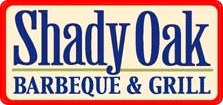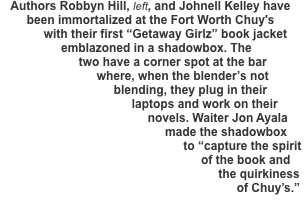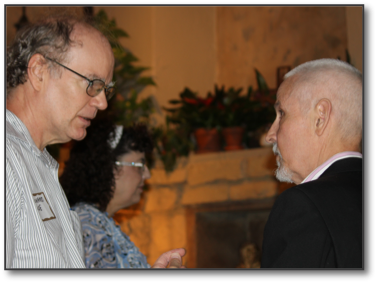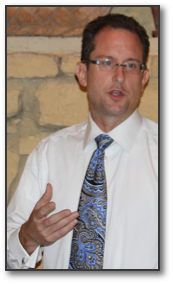Texas Tech grad
and licensed cosmetologist(!) Courtney Reece parlayed a summer internship with J.O. into a full-time job. She joined the Fort Worth marketing agency in August as junior art director. Reece spent the past four years earning a degree in fine art; while in school she interned in the Lubbock Symphony Orchestra’s marketing design department and worked as a freelance illustrator for Texas Tech University Press.
and licensed cosmetologist(!) Courtney Reece parlayed a summer internship with J.O. into a full-time job. She joined the Fort Worth marketing agency in August as junior art director. Reece spent the past four years earning a degree in fine art; while in school she interned in the Lubbock Symphony Orchestra’s marketing design department and worked as a freelance illustrator for Texas Tech University Press.







Kelly O’Brien, left, director of the TCU Neeley Professional Development Center, speaks to members
and guests at the Aug. 28 meeting of IABC Fort Worth at Joe T. Garcia’s Mexican Restaurant. O’Brien discussed the “90 Percent Factor,” a reference to knowing how to relate to people based on their needs and
personality type. He identified four personalities — expressive (expresses feelings), driver (likes control), relater (needs
positive feedback) and analytical (asks questions) — and said it’s important to understand your teammates’ type so you’ll know how they like to receive information.
Right, IABC Fort Worth president Paige Blankenship introduces O’Brien.
Above, IABC Fort Worth board member Tim Tune, right, talks with Richard Buse,
IABC Dallas president.
Above, IABC Fort Worth board member Tim Tune, right, talks with Richard Buse,
IABC Dallas president.


Speaking at a mixer last month at Winslow's, political consultant Bryan Eppstein
said a potential candidate must ask four questions before deciding to run for
election: Can the race be won? Are finances sufficient? Who’s the opposition? Can my background withstand scrutiny? August was packed at
PRSA, as membership committee members Claire Olson, Chris Smith and Megan
Patak, from left, also met, at Mi Cocina.

PRSA local update IV: Standing reminders. The DFW Communicators Job Bank lists full-time, part-time and internship positions in PR, media affairs,
advertising/sales, event planning, graphic design, marketing, and corporate and
employee communications throughout North Texas. Employers who are members of
the participating organizations may post a job listing for $75; the cost for
nonmembers is $100, for nonprofits $50. Each posting runs a month. Greater Fort
Worth PRSA receives a portion of the proceeds when a member marks his or her
membership status on the submission form. More from
Jerrod Resweber, Greater Fort Worth PRSA job bank chair, at jresweber@webershandwick.com or 469-375-0216. ... Stay on top of emerging trends and industry news, extend
your network while increasing your knowledge, and keep learning and stay
competitive. Any practitioner with at least two years in the field is eligible
for membership in the world’s leading organization for PR professionals. Those with fewer than two years
experience or who recently graduated from college and were active in PRSSA may
join as an associate member. More from chapter president-elect Chris Smith at csmith501@charter.net.
PRSA local update V: With the news cycle ever accelerating, how can PR practitioners track public
sentiment on social media and, when necessary, correct erroneous information?
SMU j-prof Jake Batsell will lead a discussion on real-time ethics and accuracy in social media, with
examples ranging from breaking Supreme Court decisions to celebrities’ Twitter tussles with airlines, at the Dallas PRSA meeting Thursday, Sept. 13.
Info here.
Freedom of Information Foundation of Texas update: To the question “Why do public records matter so much and how do they affect me?” consider the case of a government program aimed at helping America’s disabled veterans. It provides benefits for heroes who returned home from war
unable to take care of themselves or their finances, only to fall victim to
theft, fraud and hollow promises by the Department of Veterans Affairs.
According to a recent Houston Chronicle/Hearst newspaper investigation, “The government has never adequately tracked fiduciaries’ thefts from disabled veterans. The inspector general’s office says it conducted 315 fiduciary fraud investigations from October 1998
to March 2010, resulting in 132 arrests for thefts amounting to $7.4 million.
But a Chronicle analysis of court records and documents obtained though the
Freedom of Information Act shows the thieves took more than $14.7 million since
1998 — nearly twice the amounts reported to Congress.” President
Lyndon B. Johnson signed into law the Freedom of Information Act on July 4, 1966, so abuses like
this would be reported. • Elected and appointed officials and their staff can send text messages back and
forth with little tracking, and rarely are they archived. Thus a headline in
Dallas Morning News reporter Brandon Formby’s ongoing investigation of the Dallas Cowboys dealings with Irving City Hall — “Former employee’s affidavit accuses [city manager Tommy] Gonzalez of encouraging staffers to delete public records” — rings a bell loudly. Finger-pointing since 2009 has escalated into a legal
affidavit submitted as part of a $100 million-plus lawsuit filed against the
city. Will the Texas attorney general get involved to make sure it’s not common practice within Dallas city government to avoid disclosure under
Texas public information laws? At a minimum, FOIFT encourages the trial court
to issue a temporary restraining order prohibiting the destruction of
additional records.

































